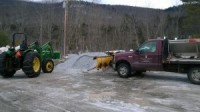Winter is still holding on here at F&W but we are no longer sanding the roads!
At F&W we recently abandoned our sand road salt mix in favor of crushed stone. The rock salt that is used as a de-icer/anti-caking agent in the sand we were using on our roads is a bad idea from an environmental perspective.
Although we were using this sand/salt mix in miniscule amounts in comparison to highway departments, road salt has really bad environmental consequences, such as damaging vegetation. The worst damage occurs when it melts because the sodium and chloride enter the local freshwater ponds and streams, increasing in concentration, which can be harmful to fish, amphibians, and other freshwater life. In fact, the use of road salt can ultimately lead to the destruction of freshwater sources. Many wells in western New York are no longer producing safe water for human consumption as a result of the use of road salt. On average in New England, state highway departments often spread up to 8 tons of road salt per lane every highway mile.
We noticed that our local highway department in Plymouth had made the switch crushed stone. We followed their lead and discovered that it is not only is a safer alternative, but adds additional road base that we normally have to truck in for the roads around camp! This saves us some time and fuel, transporting and spreading the material. So far, it has worked quite well! If you are interested in learning more about the destructive effects of salt used on our highways, you can start with the following links:
http://www.sevendaysvt.com/vermont/vermonts-winter-eco-imperative-hold-the-salt/Content?oid=2128640
Jay Kullman
Resource Director






